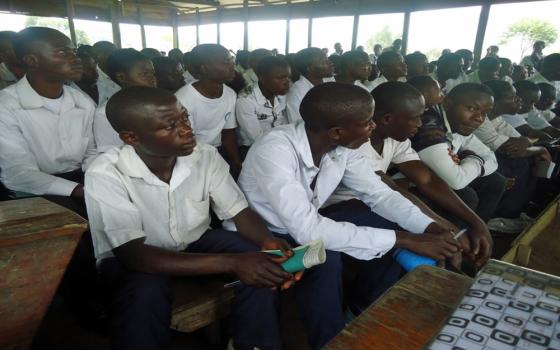In 2005, two years after my first religious profession, I was on mission in Kalima, province of Maniema, in one of the landlocked places of the Democratic Republic of Congo. I was there to mentor and supervise teachers in Lycee Chemchem in St. Peter’s Parish.
The very first time I met with the sixth level students of this high school, I cried for some of them, because of their inability to read and write. The situation overwhelmed me and I felt pity for them. These poor young people! Their only hope of escaping their misery was their education, which their parents paid for with difficulty. Without education, their intellectual development would be hindered, and they would not be able to obtain a diploma. Even if they got their diploma, they would not be prepared for what was expected in a job corresponding to the diploma they held.
I felt called to do something, but did not know what to do. In my perplexity, I shared my internal turmoil with my community, and my sisters explained to me that lack of education was a widespread problem in this area. The problem was almost impossible to solve because of a lack of well-trained teachers in the vicinity.
This made me think of our founders, St. Angela Merici and Fr. John Lambertz, who had a particular concern for the education of young people. Faced with this situation that demanded my action, I took the time to pray with our founders for inspiration.
While continuing to pray, I began to talk over my concerns with the principal and the director about what I had learned about the students’ level of education. Our conversations shed light on the situation, and as a result, they gave me space to instruct the children outside class hours.
I was happy, but was afraid of not being up to the task. It would not be easy, because besides teaching, I had to prepare for the next lessons for my students in class 3 to 6. In the Congo, secondary school goes up to class 6.
It was tiring for me to teach all day, and then use my nights for class preparation, correcting papers and writing lesson plans. But thanks to the Lord giving me grace, I did not neglect any of my religious or academic duties, and I stayed in good health.
After just two months we saw a great transformation among my students, who actually began to correct some of their teachers’ spelling mistakes and oral expressions! Therefore we felt the need for giving support and guidance to teachers, because the teachers asked the prefect if they could follow my lessons, too.
Little by little, the level of success rose in our school: more students passed the state exam and they were more successful in their job searches. The longer they worked at their jobs, the more they were appreciated; then, our school became overpopulated because other parents were looking for the quality training provided in our school. Increased enrollment has allowed the prefect to pay teachers well, has awakened the professionalism of our teachers, and given us all the satisfaction of a job well done.
They say the Lord writes straight with curved lines. My presence for two years at that school was God’s way of improving the lives of the poor in that place by using me. By freeing a group of young people from ignorance, we improved the lives of all the people in the locality. As a result, our institute became a pilot school for the Kalima area, and contributed to the development of this isolated region.
Even beyond the secular curriculum, I also found the opportunity to speak of God to these young people, and some of them expressed their desire to receive the sacraments. This training has had a positive impact on the whole area. Thanks to the different responsibilities that these young people have assumed, and the services they have rendered and continue to make in society as doctors, magistrates, nurses, and teachers, they have improved their own living conditions, as well as those of society.
From this group came two missionary priests: one Xaverian, currently on mission in Manila (the Philippines), and the other a White Father in Mali (West Africa), as well as married couples who are very active in their church. The couples involved in the parish as well as the newly ordained priests all feel an attachment to the Ursuline community.
This experience of my apostolic mission in Kalima remains a source of inspiration for me. Through this I have felt more and more enthusiasm and joy in giving myself completely to others for the love of Christ. And I have seen proof that God works with us in all our ministries.
Editor's note: Ursuline Sr. Jane Quinlan provided assistance in the translation of this column.
[Espérance Kanyere is a Congolese sister, a member of the Congregation of the Ursuline Sisters of Tildonk in the Democratic Republic of the Congo, in Goma, the North-Kivu province.]

